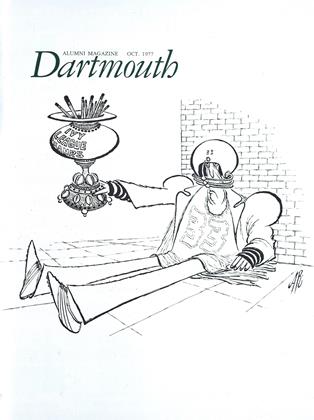"Reorganization is typically more a process than an event," muses John E. Hanson, the College's first dean of students. Hanson, in the long tradition of Dartmouth deans, is a relaxed and engaging man. On meeting him, .one might think he had just finished a game of touch football rather than a meeting of administrators - if not for the long lines of students queued outside the door of his yetto-be decorated office. His position was created last spring to take over some of the duties of the dean of the College, and he has been on the job about two months.
A 1959 graduate of the College, Hanson headed west after Dartmouth. He received a Ph.D. from the University of Oregon, and served as dean of Linfield College in McMinnville, Oregon. More recently he was associate dean of students and a visiting scholar at Stanford. But after those years out west, Hanson found the offer of a Dartmouth deanship very attractive. "It's interesting to come back after 18 years," he says. "So much has changed - the Hopkins Center, Kiewit, Murdough, Gerry, etc. - and yet the essence of the place is much the same as it was when I was an undergraduate."
Charged with the "overall welfare of all undergraduate students," the dean of students handles many of the service functions previously undertaken by the dean of the College, such as academic counseling and regulations, degree requirements, advising organizations and activity groups, and writing recommendations for graduate schools. In a broader sense, Hanson views himself as a catalyst and mediator: "A lot of what we do is reactive rather than proactive. But as educators we can initiate programs [a current possibility is a workshop on the meaning of masculinity and femininity] and also insure that the avenues of communication are open."
Hanson looks favorably upon the major changes at the College since his undergraduate years. "The advantages of the Dartmouth Plan, the opportunities for internships and interesting jobs, far outweigh the disadvantages," he says. "Interestingly enough, class cohesion appears to be even stronger because of a reaction by the class members to the threat posed by the flexibility of the plan." Calling co-education "the single most important event at Dartmouth since the founding of the College," Hanson believes in the value of tradition, but cautions against unthinking reliance on the customs of the past. The deepest traditions of the College, in his view, are intellectual excellence and a belief in the primacy of liberal arts. He thinks recent changes have brought Dartmouth closer to its original charge, to educate "whole people," than ever before. "Change is necessary to keep even a relative position in the world," notes Hanson. "Perhaps the best thing we can do for students is to instill in them a taste for change."
 View Full Issue
View Full Issue
More From This Issue
-
 Feature
FeatureMen and Women: What's the Difference?
October | November 1977 By Dan Nelson, Shelby Grantham -
 Feature
FeatureThe Singing of the Cider
October | November 1977 By Sanborn Brown -
 Feature
FeatureThe Bakke Case
October | November 1977 By John G. Kemeny -
 Feature
FeatureWith Pen In Hand...
October | November 1977 By Arnold Roth -
 Class Notes
Class Notes1971
October | November 1977 By THOMAS G. JACKSON -
 Article
Article"My hardships were excessive"
October | November 1977
Article
-
 Article
ArticleCHAPEL ORGAN IMPROVED THROUGH RECENT GIFT
February, 1922 -
 Article
ArticleDartmouth in Portrait
December 1943 -
 Article
ArticleLocal Strife
September 1975 -
 Article
ArticleLow-IQ Computing
SEPTEMBER 1989 -
 Article
ArticleA NEW VOCATION FOR COLLEGE MEN
By Emmett Hay Naylor '09 -
 Article
ArticleConcerning the Hydrogen Bomb
June 1950 By Gordon Ferrie Hull

